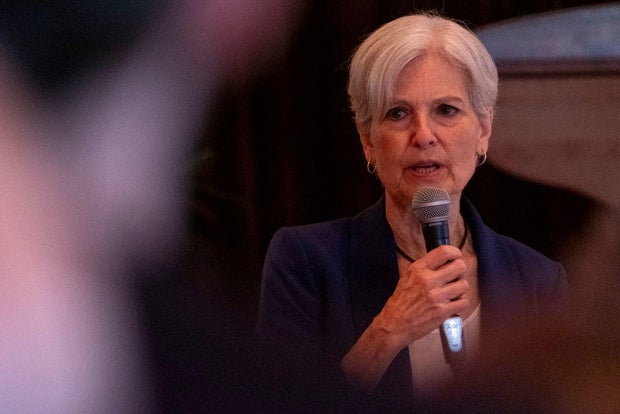Jill Stein, now on her third run for president with the Green Party, is seen as a longshot for the White House and often called a spoiler candidate who pulls votes from the Democratic side.
Though Stein claims her candidacy has a legitimate path to victory without relying on what she calls “war machine” dollars, her campaign has accepted support from Republican allies as she works to secure ballot access in multiple states, including key battleground states like Nevada and Wisconsin, where CBS News polling shows a close race between Vice President Kamala Harris and former President Donald Trump.
In Nevada, where the Green Party was removed from the ballot earlier this month because of incorrect petition forms, according to the Nevada Supreme Court, the party is seeking reinstatement and is being represented by Jay Sekulow, an attorney who represented Trump during his impeachment trials.
“In case you missed it, the @NVSOS gave the campaign the wrong forms to use to get on the ballot. Then the dirty Dems used that technicality to sue us off the ballot – we won in lower courts, only to lose in the NV Supreme Court,” Stein wrote on X last week. “Our lawyers have said that we have a case that the US Supreme Court may take which will make ripples nationwide.”
Joel Angel Juarez for The Washington Post via Getty Images
On Friday, the Nevada Green Party asked for emergency intervention from the U.S. Supreme Court to review the Nevada Supreme Court’s ruling under the pro bono guidance of Sekulow, the Stein campaign told CBS News.
In Wisconsin, where the state Supreme Court ruled to keep Stein on the ballot after declining to hear a Democratic National Committee challenge, Stein accepted legal representation from Michael D. Dean, a Wisconsin lawyer involved in lawsuits attempting to overturn the 2020 election results on behalf of Trump, according to an ethics complaint filed by the bipartisan group The 65 Project.
While Democratic allies claim that Stein’s collaboration with Trump-affiliated lawyers is disqualifying, her campaign argues that it’s simply responding to efforts to keep them off the ballot, leaving them no choice but to accept support wherever it comes from — even if it’s from Trump allies.
“When the Democrats put us in a position of having to respond to a legal challenge, we’re going to take the help that’s available to us,” said Jason Call, Jill Stein’s campaign manager. “And so the fault begins and ends with the Democratic Party on this. We understand that Republicans are going to want to help us for their own reasons, but our reasons are for democracy.”
The Stein campaign learned over the weekend that yet another lawsuit had been filed against the third-party candidate in New Hampshire. In response, the campaign stated it is ready to accept assistance from partisan lawyers if it has to in order to secure ballot access.
While there are no laws barring a third-party candidate from accepting pro bono support from another major party in any state, Democratic allies are pushing back on Stein’s ballot access efforts.
“These third-party candidates are being presented to voters without a full picture of their views, their financial backers, and the impact they would have on the election,” said Joel Payne, chief communications officer for MoveOn, a left-leaning political action committee. “They also need to be held accountable in good faith or within the bounds of the law—no differently than major party candidates.”
The tug-of-war between Republican and Democratic Party allies to influence the outcome of the election extends to other third-party candidates as well. Recent Associated Press reporting shows that Cornel West has a network of GOP operatives supporting his campaign, while Robert F. Kennedy Jr., who suspended his presidential bid last month and endorsed Trump, is now working to remove himself from ballots in states where he believes his candidacy could siphon votes away from Trump.
“It seems unity is only convenient for some people when it aligns perfectly with their agenda,” said Edwin DeJesus, spokesperson for the West campaign. “Yet, when lawyers with certain political leanings support Dr. Cornel West, who has consistently spoken out about genocide, it’s suddenly a problem.”
Both Stein and West have faced numerous legal challenges from Democratic Party allies aimed at removing them from ballots in various states.
“Jill Stein has no path to win the presidency, but just like she did in 2016, she can help Trump win,” said Democratic National Committee spokesperson Matt Corridoni. “That’s why the GOP is doing everything in their power to get third-party candidates on the ballot as spoilers in key swing states. Voters should see this cynical effort for what it is. The fact remains: only two candidates have a path to 270 and the only way to stop Donald Trump is by voting for VP Harris.”
Both parties working to influence the ballot outcome in multiple states through third-party candidates isn’t new, experts say.
“It’s smart politics, on the Trump end, to try to siphon votes off from Harris,” said John Geer, political science professor at Vanderbilt University. “Politics is not for the faint of heart, and you’ve got to be ready for a lot of ‘unfair’ things to happen because it’s war, it’s a winner takes all contest, and finishing second place is no consolation.”
Trump, who has embraced Kennedy as an ally, has previously spoken fondly of both Stein and West.
“Cornel West, he’s one of my favorite candidates,” Trump said during a campaign rally in Philadelphia in June. “I like her also, Jill Stein, I like her very much. You know why? She takes 100% from them. He takes 100%.”
